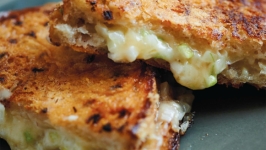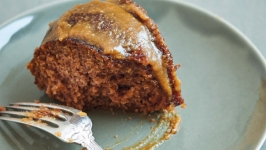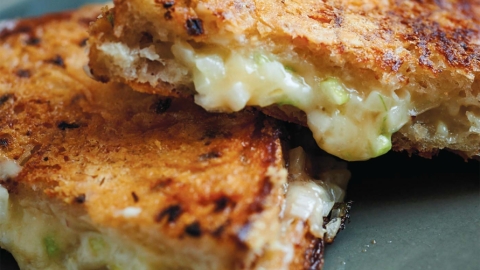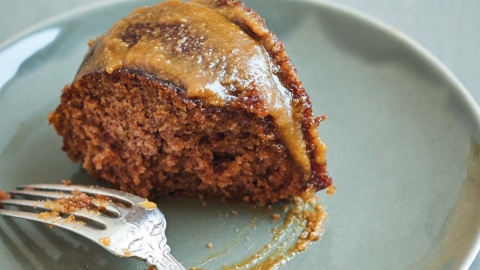Catching Up With Ruth Reichl
“Bread is my favorite food. Something wild, crusty, deeply brown, with a moist crumb and impressive elasticity, spread with cold, sweet butter.” –Ruth Reichl
High atop a rolling hill in Columbia County, New York, 130 miles north of Manhattan, a one-story home with glass walls offers sweeping views across the Hudson Valley to the Catskills farther west. This peaceful dwelling exudes a Japanese minimalist aura, complete with a natural soundtrack of rustling trees and birdsong. This is where the renowned food journalist Ruth Reichl and her husband, Michael Singer, have created a serene rural retreat from their former urban lifestyle.
I met Ruth last August at the Martha’s Vineyard Book Festival where she appeared in conversation with Joan Nathan and Francis Lam, host of “The Splendid Table.” This power trio of friends couldn’t have been more relaxed and engaging. Joan Nathan had just published her memoir, My Life in Recipes: Food, Family, and Memories (see Edible Vermont Fall/Holiday 2024), and Ruth’s new book, The Paris Novel, had recently debuted.
After the event, Ruth generously invited me to visit her at home in early September. We spent 2½ hours talking about various parts of her storied 55-year career (with no signs of slowing down) in food journalism. Two decades as a restaurant critic for the Los Angeles Times and New York Times. Ten years as editor-in-chief of Gourmet Magazine. Author of a dozen cookbooks, memoirs, and novels.
La Briffe, her popular Substack weekly newsletter. Food and Country, the documentary film she coproduced and released in October 2024. Ruth has also earned six James Beard awards, including the prestigious Lifetime Achievement award in June 2024, but she was too humble to dwell on those honors.
Knowing Ruth loves bread and butter, I arrived with a basket of some of Vermont’s finest: three freshly baked sourdough loaves from Earth Sky Time’s wood-fired oven, an assortment of Ploughgate Creamery’s cultured butters, and Maplebrook Farm fresh mozzarella and smoked ricotta. Ruth’s smile lit up the kitchen. “This is perfect! We’re having dinner tonight with Al Franken.”
“Bread is my favorite food,” she continued. “Something wild, crusty, deeply brown, with a moist crumb and impressive elasticity, spread with cold, sweet butter. I love making Jim Lahey’s famous noknead recipe because it produces an astonishingly satisfying loaf every time.”
During the early months of the pandemic, Ruth traded her home-baked loaves with neighbors for other provisions that included eggs and hand sanitizer. “I baked because I didn’t know what else I could do. All the local stores and even King Arthur were out of flour. I went to my pantry, scooped some flour into a bowl, added yeast and water, kneaded fiercely. I waited as the dough rose and eventually transferred it to the oven. Soon the comforting aroma of bread began to fill the kitchen and swirl throughout the house. It felt like a benediction.”
No wonder she earned the James Beard Lifetime Achievement award.
“The very idea of honoring anyone for a lifetime in food would have seemed absolutely absurd to a 22-year-old in 1972 who had just published her first cookbook,” Ruth shared in her acceptance speech. “At that time, chefs were all male, mostly European, and certainly didn’t want women in their kitchens. Restaurants served mostly continental cuisine. Produce was tasteless; coffee was dust. Food writing was relegated to polite, recipe-filled magazines and what was then known as the ‘women’s pages’ of newspapers.”
If you haven’t read Ruth Reichl’s books, you should. In fact, commit to reading them all, particularly her memoirs that include recipes. Save Me the Plums takes readers through Ruth’s rollicking Gourmet years, from the zany joys and extravagant parties to the challenges of transforming the staid magazine into a cutting-edge media giant—until it folded under her watch in 2009.
My Kitchen Year: 136 Recipes that Saved My Life chronicles the aftermath of shuttering Gourmet, her roiled emotions, and her transition from Manhattan to her family’s quiet retreat in upstate New York. “I was really depressed when Gourmet closed. It was such a great group of people, and I feel I let everyone down. I feared none of us would get jobs. Of course, that’s not how it worked out. Fortunately, my agent Kathy Robbins and I made a plan and landed a five-book deal with Random House.” (Ruth had already authored six books by then.)
Ruth settled back in her chair and ran a hand through her wonderfully tousled, thick, dark hair. “Fifty years ago, America’s interest in food was so minimal that serious writers refused to choose it as their subject. But a handful of us really cared about it, and we were all in it together, trying to take American food to a place where we know it could be. I moved to Berkeley in the early 1970s. Alice Waters at that point was just a young beautiful woman who had Chez Panisse, this cool restaurant none of us could afford. Kermit Lynch (the wine merchant) had a little storefront with crates of wine stacked on the floor and a bottle on top. I’d go down there and drink wine with him. No one had PR people in those days. I could walk into a restaurant and talk with the chef without having to go through layers of handlers. Wolfgang Puck was a young chef; he just let me hang out. Over time, I got to know everyone. My timing was really, really lucky. Opportunities came along that I wasn’t prepared for, but how could I say no? I was three seconds ahead of the zeitgeist.”
Ruth Reichl continues to embrace the unknown. When her editor suggested she expand a story about a sleek black dress that appears in Save Me the Plums, Ruth went to her cozy writing studio and emerged with The Paris Novel, an enchanting fairy tale romp through Paris and France that weaves food, fashion, art, and literature. “Almost everything about this book makes me happy. Writing it was pure pleasure. Just saying that seems strange because I usually hate writing. I will do anything to avoid staring at a blank screen. However, I love having written. There is no better feeling than getting up from the desk a thousand words richer. That feeling is the drug that keeps me hooked.”
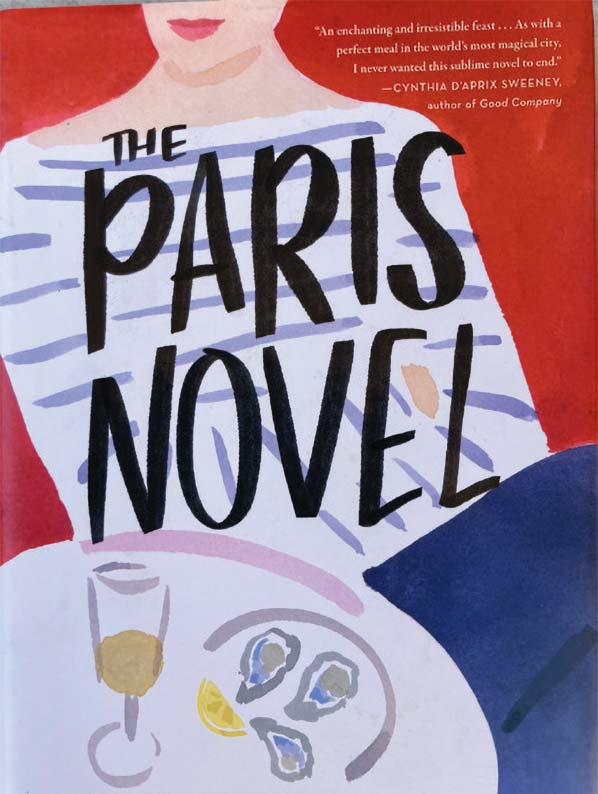
Ruth’s newest work is a fairy tale must-read for anyone who loves Paris.
“Fifty years ago, America’s interest in food was so minimal that serious writers refused to choose it as their subject. But a handful of us really cared about it, and we were all in it together, trying to take American food to a place where we know it could be.” –Ruth Reichl
The pandemic provided an unexpected springboard to deeply meaningful work, culminating in Food and Country, the award-winning documentary she both stars in and co-produced.
“My husband, Michael, and I flew home from Los Angeles on March 11, 2020. Like the rest of the world, we were terrified. When I saw the local supermarket was empty of food, I told Michael that this may be the moment I’d been waiting for my entire life. Americans had never seen a grocery store with completely empty shelves. All we’d ever done was take food for granted. Now, people would be forced to consider where their food comes from. And stuck at home, people would cook more for their families.”
Ruth reached out to friends and strangers in the food industry across the United States and asked what they were experiencing, how the pandemic was impacting their businesses. “People were devastated. I knew this would be monumental, so I wanted to keep a record and see how things unfolded and where we would end up.”
Over the course of two years, Ruth spoke over Zoom and phone with 178 people, most of whom she didn’t initially know. She joined forces with the director Laura Gabbert, and the two produced Food and Country, a powerful documentary that explores many aspects of our broken food system, as revealed through the personal stories of farmers, ranchers, fishermen, chefs, and a community food activist.
“Following World War II, the government decided the easiest way to fight communism was to have the cheapest, most abundant food in the world. That has been government’s food policy since 1948. And the unintended consequences have been devastating for farmers, workers, and the environment. Yes, we have the cheapest food compared to the rest of the world, but we’re all sick from it. The people featured in this documentary are true heroes. Over the course of the pandemic, they committed to change their approach and develop more sustainable business models and healthy systems for their communities.”
Every time I lose myself in one of her works, I marvel at Ruth’s ability to convey universal human experiences: love, loss, longing, joy, hunger, satiation. She remains attuned to the nuances that make life rich, people intriguing, and food worthy of well-crafted words.



